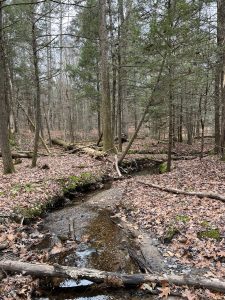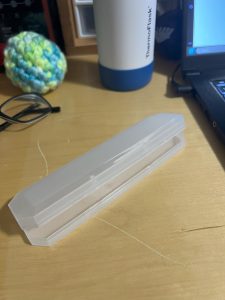The woods on campus are not something most people would think of when they think of waste, but when thinking about what the trail is called, a “nature trail”, you start to realize that it’s related to waste separation more than you might have originally thought. Nature trails are meant to be a way of allowing people to separate themselves from technology, buildings, and generally any visible human influences on the world. This can be thought of as a form of waste separation, although instead of removing the waste from the view of people, the people are being removed from the waste. In this case, the waste is not really being taken care of, since this form of waste separation is just ignoring the issues at hand in favor of looking at the parts of the world that do not look like they are fully affected. This, unfortunately, leads to waste being added to these areas since people will throw empty bottles and food wrappers on the ground deciding that it does not matter since they will never see it again.

Tag Archives: waste
Disposal of Difficult Waste
Every year or so my family tends to have accumulated a collection of waste that can not be thrown out in the normal trash and recycling bins. Things like old paint cans, electronics, scrap wood, and small furniture items are a bit difficult to dispose of, and while it is easy to get rid of furniture during bulk trash pick up month, the other things need to be taken to our local transfer station, which is luckily only a few minutes from my house. Using the transfer station puts a little more responsibility on us as we need to make sure what we’re bringing there is accepted, and we need to make sure what we are bringing is separated as needed before we get there. In addition, it should also be light/small enough that machinery isn’t needed in order to put it in the bins (unless the workers are aware and prepared for what you’re bringing). Using the past summer as an example, I had to bring two boxes of old paint cans, three broken computers, and a box of scrap wood to the station. Before leaving, I made sure the items were organized in my car so that it would be quick and easy to dispose of them, and I also removed staples and nails from the wood in case metal and wood needed to be separated. When I got there, it was my responsibility to put the waste into the correct locations. The waste was my responsibility up until I left the facility, and from there, it became the responsibility of the waste workers to transport and process the waste. While I don’t know a lot about how waste is processed in waste facilities, I imagine the wood is turned into woodchips, mulch, or shavings in order to give it another use, and metal is salvaged and melted down.
Container From Hall Trash
I found this container in the bathroom trash of my hallway, it was a bit more towards the top on the side, so I did not have to do a lot of digging in order to find it and get it out. I am almost certain it was my friend who threw it out since we are the only two people living in our hall, which helped me feel better about taking it out of the trash and washing it for future use. I chose this object because a solid, closable container can be very useful, and I am currently using it to store loose hardware parts like nuts, washers, and screws. I think if I had found it in a more public trash container I would not have taken it out unless I was able to either see all of the contents inside or wash my hands immediatly after, since I don’t feel great about unknown germs. I do have an example of me going through a public trash bin from the past week, however, because at some point in the middle of the night my friend called me to tell me a mouse was trapped in the trash (the sides were too high to jump over and too smooth to climb), so I went to where they were, tipped the trash bin over, and helped them empty it so the mouse could get out. I felt ok going through this trash because there were only three things in it, all of which were mostly empty food containers. I also had the motivation of helping a friend feel better, which overpowered my unease of going through a trash bin.

Matter Out of Place – Jar of Loose Change
The object I chose for this prompt is a plastic jar I got in my second year of high school. I got it after buying some overpriced popcorn from a school club fundraiser, and after finishing the popcorn, I decided to hold on to the jar since it looked useful. I cleaned it completely, as I did not want to attract insects to my room or allow mold to grow from the food residue. This jar that once held food would be seen as completely out of place in my bedroom, a location that is in no way associated with food storage, making this jar, in the eyes of Mary Douglas, waste. Not only is this matter out of place, but the container was also intended to have the lifespan of the food within it. Once the food inside had been consumed, it was meant to be thrown away, just like any other container. This knowledge makes the container out of place no matter where you decide to keep it. Once the food that lives in the container is gone, the container is meant to be out of sight, an idea we use for most of the waste in our lives.

How Waste Can Fluctuate
 A plastic bottle of soda that has been drunk is considered waste. It is an extremely common object that people pick up after every gas station trip or meal at the Bridge. You will find a plastic bottle in pretty much every trash can or recycling bin on campus. “Matter out of place” is how Mary Douglas defines dirt, in this case a plastic bottle would qualify. When it was full it was matter in the correct place but by the time it was empty it became out of place because it can no longer be used for its intended purpose. “Use” or “potential” is a better way of distinguishing what is dirty and what is not. That concept would also allow the ideas of dirty and clean to fluctuate and change based on perspective. When it comes to a plastic bottle it could be considered dirty or waste when you finish your drink but you could also wash it and use it again which would prevent it from being waste, or you could recycle it and it could become something new which would prevent it from becoming waste, or it could be tightly packed full of plastic and become an eco-brick to build a home and prevent even more waste.
A plastic bottle of soda that has been drunk is considered waste. It is an extremely common object that people pick up after every gas station trip or meal at the Bridge. You will find a plastic bottle in pretty much every trash can or recycling bin on campus. “Matter out of place” is how Mary Douglas defines dirt, in this case a plastic bottle would qualify. When it was full it was matter in the correct place but by the time it was empty it became out of place because it can no longer be used for its intended purpose. “Use” or “potential” is a better way of distinguishing what is dirty and what is not. That concept would also allow the ideas of dirty and clean to fluctuate and change based on perspective. When it comes to a plastic bottle it could be considered dirty or waste when you finish your drink but you could also wash it and use it again which would prevent it from being waste, or you could recycle it and it could become something new which would prevent it from becoming waste, or it could be tightly packed full of plastic and become an eco-brick to build a home and prevent even more waste.